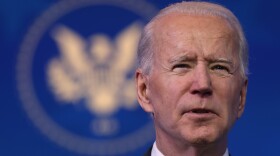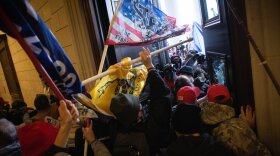Updated at 9:40 a.m. ET
When Joe Biden gives his inaugural address this week, he will do so from a place that will illustrate the magnitude of the challenge he faces as the 46th U.S. president — and will test his ability to find the right words to begin to unite a divided nation.
The very platform Biden will stand on was swarmed only two weeks ago by a mob of insurrectionists seeking to overturn the results of the election, some using American flags as weapons in a place where presidents, going back generations, have held up a peaceful transfer of power as a core American ideal.
"In the eyes of many in the world, this every four years ceremony we accept as normal is nothing less than a miracle," President Ronald Reagan said in his 1981 inaugural address.

And in a fundamental break with 150 years of tradition, Biden will not be able to turn to his predecessor, sitting behind him, to thank him for making the transfer of power possible. President Trump won't be there.
Even in his dark and divisive inaugural address in 2017, remembered for his proclamation that he would stop "this American carnage" faced by "the forgotten men and women of our country," Trump endorsed the tradition.
"Every four years, we gather on these steps to carry out the orderly and peaceful transfer of power, and we are grateful to President Obama and first lady Michelle Obama for their gracious aid throughout this transition," Trump said in his speech.
Trump has not even congratulated Biden, the transition has been rocky, and there is no way to describe this transfer as peaceful. Ongoing security threats — combined with coronavirus risks — will leave the National Mall largely empty, instead of thronged with thousands of people.
It's all combining to give Biden an oratorical challenge unlike any president who came before him.
"There are threads of analogies that you can pull from other speeches, but there is not a boilerplate that Joe Biden can pull from to give him a sense of what to do here," said Jeff Shesol, a historian who was a speechwriter for former President Bill Clinton.

The details of Biden's address have been kept under tight wraps, and it remains to be seen whether he will echo other presidents who took office during crises.
Biden enters the White House with the top challenge to lift the country from the devastation of a pandemic that has so far killed nearly 400,000 Americans and thrown millions into economic despair.
In 1933, former President Franklin Delano Roosevelt bluntly took on the ravages of the Great Depression in his inaugural address.

"A host of unemployed citizens face the grim problem of existence, and an equally great number toil with little return. Only a foolish optimist can deny the dark realities of the moment," Roosevelt said in a speech remembered for his line that "the only thing we have to fear is fear itself."
Biden will also be addressing a nation where most Republicans say they don't trust the results of the 2020 election were accurate.
The circumstances are not completely analogous, but in 2001, former President George W. Bush also faced the challenge of giving his inaugural address when many Americans were still outraged after a contested election decided by the Supreme Court.
"Sometimes our differences run so deep, it seems we share a continent but not a country. We do not accept this," Bush said in a speech that also thanked his opponent for a contest "conducted with spirit and ended with grace."

Biden also has to respond to the deep rifts in American society exposed by the racial justice protests over the summer and now the riot at the Capitol with all its racist symbols.
Presidential historian Russell Riley said 1968-69 was a somewhat comparable time, when Richard Nixon — who had campaigned on a wave of resentment — took office after the country was riven by riots, antiwar protests and the assassinations of Martin Luther King Jr. and Robert F. Kennedy.
"It was a country that was torn apart, and Nixon understood that his chief mission was healing," said Riley, from the University of Virginia's Miller Center. "That's not a word that's usually associated with Nixon because of what happened in subsequent years, but certainly in January of 1969, that was something that was pre-eminent in his mind."

In his 1969 speech, Nixon called on Americans to summon their better angels.
"We are caught in war, wanting peace. We are torn by division, wanting unity," Nixon said in his address. "We see around us empty lives, wanting fulfillment. We see tasks that need doing, waiting for hands to do them. To a crisis of the spirit, we need an answer of the spirit. To find that answer, we need only look within ourselves."
Though Biden's task is uniquely challenging, inaugural addresses almost always hit notes of healing.
"The founders put an awful lot of responsibility on an incoming president to unite the country when it was badly divided and hurting as it is right now," said historian Michael Beschloss.
He does have to try to draw Americans together. And yet he also has to show that he is not naive.
Biden's inaugural theme is "America United," but in remarks last week, he acknowledged the obvious: America is quite divided. "We've seen clearly what we face now," Biden said before insisting he was still optimistic.
In his address, Biden faces a tricky dilemma, said speechwriter Shesol.
"He does have to try to draw Americans together. And yet he also has to show that he is not naïve," he said.
"I think the typical gauzy appeals to national unity that you typically get in inaugural addresses really aren't going to wash here," Shesol said.
Copyright 2021 NPR. To see more, visit https://www.npr.org. 9(MDA3MzEzNjc2MDEzMDI2Mzc4OTc4NTFmNg001))















